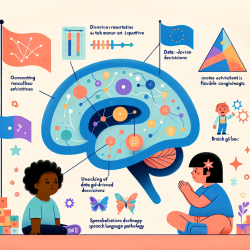Introduction
As a practitioner dedicated to creating positive outcomes for children, understanding the role of the hippocampus in flexible cognition and social behavior can significantly enhance your therapeutic strategies. Recent research, particularly the review article "The role of the hippocampus in flexible cognition and social behavior" by Rubin et al. (2014), offers valuable insights into how this brain structure supports adaptive behaviors crucial for child development.
The Role of the Hippocampus
The hippocampus, traditionally associated with long-term memory, plays a critical role in flexible cognition. Flexible cognition involves the ability to generate, update, and integrate past and present information to adapt to new situations. This process is essential for tasks ranging from navigation to social interactions.
Key Findings from the Research
Rubin et al. (2014) highlight several key findings that have direct implications for clinical practice:
- Relational Memory: The hippocampus supports the formation and flexible use of relational memory representations. This means it helps bind together various pieces of information and allows for their flexible use in different contexts.
- Social Behavior: The hippocampus is crucial for social interactions, including empathy, social discourse, and decision-making. Damage to this area can lead to inflexible and maladaptive social behaviors.
- Imagination and Creativity: The hippocampus is involved in generating and manipulating mental scenarios, which are essential for creativity and problem-solving.
Implementing These Findings in Practice
Here are some practical ways to incorporate these insights into your therapeutic approach:
- Focus on Relational Memory: Develop activities that encourage children to form and use relational memories. For example, storytelling exercises that require them to recall and integrate various elements of a story can be beneficial.
- Enhance Social Skills: Use role-playing games to help children practice social interactions. Emphasize the importance of understanding and adapting to different social cues and contexts.
- Encourage Creativity: Incorporate creative tasks that require children to imagine and describe new scenarios. This can help enhance their ability to manipulate and use information flexibly.
Encouraging Further Research
While these findings provide a solid foundation, ongoing research is crucial for continually improving therapeutic strategies. Encourage your colleagues to stay updated with the latest research and consider participating in studies that explore the role of the hippocampus in flexible cognition and social behavior.
Conclusion
Understanding the role of the hippocampus in flexible cognition and social behavior can significantly enhance your practice. By incorporating these insights into your therapeutic strategies, you can help children develop the adaptive skills they need to navigate their world successfully.
To read the original research paper, please follow this link: The role of the hippocampus in flexible cognition and social behavior.










